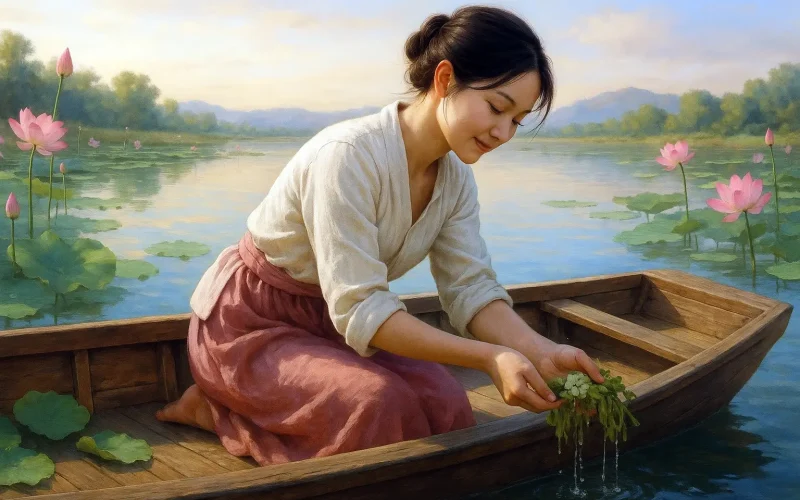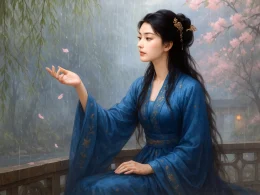The limpid stream brightens the autumn day;
On the Southern Lake we gather white duckweed.
The lotus blooms seem to gaily greet;
It breaks the rover’s heart to beat.
Original Poem
「渌水曲」
李白
渌水明秋日,南湖采白蘋。
荷花娇欲语,愁杀荡舟人。
Interpretation
This poem depicts a bright and vibrant scene of gathering duckweed in autumn, showcasing the poet's love for natural beauty and his reflections on the fluctuations of life. With a fresh and unconventional touch, Li Bai portrays the autumn lakescape with the radiance of spring, captivating the reader. This lively and poetic imagery is a testament to the unique charm of Li Bai's poetry.
First Couplet: "渌水明秋日,南湖采白蘋。"
Lù shuǐ míng qiū rì, nán hú cǎi bái pín.
The clear water glistens under the autumn sun; On the southern lake, duckweed is gathered.
The opening lines present a lucid and vivid autumn scene: the lake shimmers under the sunlight, while a young girl gathers duckweed from a boat, adding a touch of lively beauty. "Clear water" refers to the limpid lake, and the character "glistens" not only describes the water's transparency but also implies the beauty of the autumn sun's reflection, making the entire scene harmonious and full of vitality.
Second Couplet: "荷花娇欲语,愁杀荡舟人。"
Hé huā jiāo yù yǔ, chóu shā dàng zhōu rén.
The lotus blooms, delicate as if about to speak, Stirring sorrow in the boatwoman's heart.
The lotus is personified as a gentle maiden, poised as if about to speak, evoking a sense of melancholy in the boat-dwelling girl. The poet intentionally leaves the nature of this sorrow undefined, creating space for boundless imagination—perhaps it stems from the transience of youth, a lack of recognition, or unfulfilled love. Through this skillful fusion of emotion with natural imagery, the poet achieves a subtle yet profound artistic conception.
Holistic Appreciation
While depicting autumn's beauty, this poem also carries a faint trace of melancholy. The poet constructs an exquisite scene with clear water, a girl gathering duckweed, and delicate lotuses—a picture that is vivid, dynamic, and poetic. Yet, within this bright imagery, the boatwoman's sudden sorrow creates a striking contrast. The undefined nature of this sorrow allows for diverse interpretations, enabling readers to imbue it with personal meaning.
The poem's brilliance lies in its vibrant imagery and emotional ambiguity. "The lotus blooms, delicate as if about to speak" not only personifies the lotus but also infuses the poem with liveliness and tenderness, while "stirring sorrow in the boatwoman's heart" elevates the emotion to a climax, allowing readers to appreciate the beauty while sensing its underlying sorrow.
Artistic Merits
- Vivid and Fresh Autumn Imagery: The opening line "The clear water glistens under the autumn sun" creates a transparent and crystalline autumn scene, showcasing a unique beauty of the season.
- Use of Personification: "The lotus blooms, delicate as if about to speak" gives the lotus human qualities, infusing the scenery with vitality and setting the stage for the ensuing emotion.
- Scene-Emotion Fusion with Subtle Conception: The poet employs environmental description to evoke emotional atmosphere while deliberately leaving the cause of sorrow unstated, creating space for interpretive freedom.
- Use of Contrast: The shift from the bright autumn light to "stirring sorrow in the boatwoman's heart" creates a sharp contrast, enhancing the poem's emotional impact.
Insights
Set against an autumn backdrop, this poem presents a beauty rivaling spring while subtly incorporating a touch of melancholy. Its emotional ambiguity makes the poem more relatable and resonant. In reality, we often find ourselves reflecting on life while admiring beauty—whether due to the passage of time or memories of the past. This poem reminds us that even in the most beautiful moments, the fluctuations of the heart are inevitable, and it is this complexity of emotion that makes life more genuine and poetic.
About the poet

Li Bai (李白), 701 - 762 A.D., whose ancestral home was in Gansu, was preceded by Li Guang, a general of the Han Dynasty. Tang poetry is one of the brightest constellations in the history of Chinese literature, and one of the brightest stars is Li Bai.












